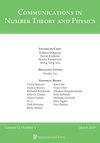Picard–Fuchs operators for octic arrangements, I: The case of orphans
IF 1.2
3区 数学
Q1 MATHEMATICS
引用次数: 8
Abstract
We report on $25$ families of projective Calabi-Yau threefolds that do not have a point of maximal unipotent monodromy in their moduli space. The construction is based on an analysis of certain pencils of octic arrangements that were found by C. Meyer. There are seven cases where the Picard-Fuchs operator is of order two and $18$ cases where it is of order four. The birational nature of the Picard-Fuchs operator can be used effectively to distinguish between families whose members have the same Hodge numbers.Picard-Fuchs算子的octic安排,I:孤儿的情况
我们报道了在它们的模空间中不存在极大单能单点的投影Calabi-Yau三倍矩阵的$25$族。这种结构是基于对C. Meyer发现的某些八边形排列铅笔的分析。Picard-Fuchs算子有7种情况为2阶,有18种情况为4阶。Picard-Fuchs算子的出生性质可以有效地用于区分成员具有相同霍奇数的家庭。
本文章由计算机程序翻译,如有差异,请以英文原文为准。
求助全文
约1分钟内获得全文
求助全文
来源期刊

Communications in Number Theory and Physics
MATHEMATICS, APPLIED-MATHEMATICS
CiteScore
2.70
自引率
5.30%
发文量
8
审稿时长
>12 weeks
期刊介绍:
Focused on the applications of number theory in the broadest sense to theoretical physics. Offers a forum for communication among researchers in number theory and theoretical physics by publishing primarily research, review, and expository articles regarding the relationship and dynamics between the two fields.
 求助内容:
求助内容: 应助结果提醒方式:
应助结果提醒方式:


